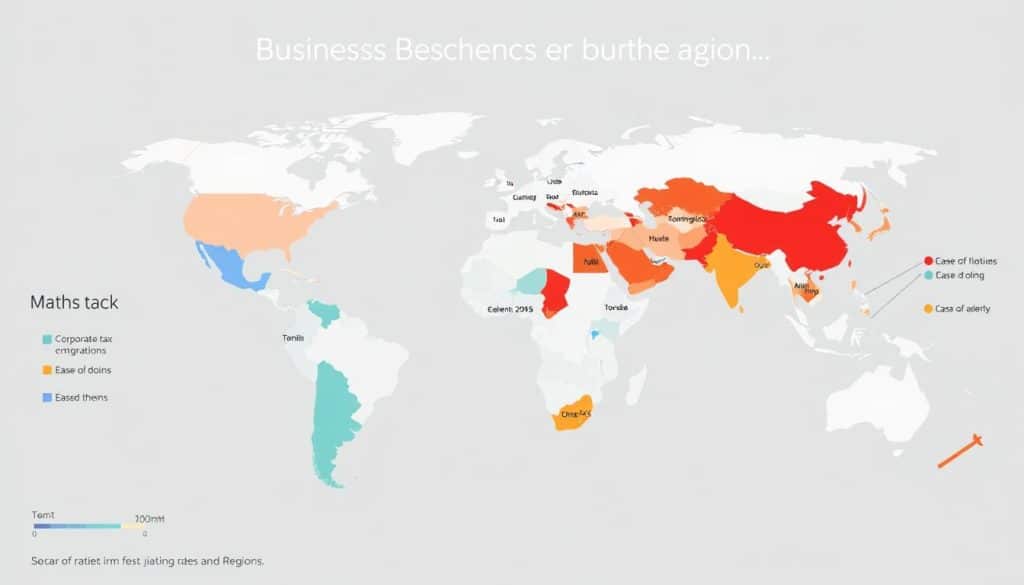Selecting the right country for business expansion or establishment can significantly impact your venture’s success. Our comprehensive analysis of business-friendly countries for 2025-2026 examines corporate tax rates, regulatory environments, and economic growth projections across 30 leading destinations. Whether you’re seeking favorable tax policies, streamlined bureaucracy, or access to skilled talent, this guide provides the essential data and insights to inform your international business strategy.
What Makes a Country Business-Friendly in 2025-2026?
The global business landscape continues to evolve rapidly, with countries competing to attract international entrepreneurs and corporations. When evaluating business-friendly countries for 2025-2026, several key factors determine their attractiveness:
Economic Indicators
- GDP growth rate and stability
- Inflation control measures
- Currency stability
- Market size and consumer purchasing power
- Trade agreements and international market access
Regulatory Environment
- Ease of business registration
- Corporate tax rates and incentives
- Regulatory transparency
- Legal protections for businesses
- Intellectual property rights enforcement
Business Infrastructure
- Digital infrastructure quality
- Transportation networks
- Energy reliability and costs
- Access to financial services
- Commercial real estate availability
Workforce Factors
- Labor market flexibility
- Talent availability and education levels
- Language capabilities
- Labor costs and productivity
- Immigration policies for skilled workers

Need Expert Guidance on International Business Expansion?
Our team of global business consultants can help you navigate the complexities of establishing your business in the most advantageous jurisdictions.
Our Research Methodology
Our analysis of business-friendly countries for 2025-2026 incorporates data from multiple authoritative sources, including the World Bank, International Monetary Fund, World Economic Forum, and country-specific economic reports. Each country is evaluated based on:
| Metric | Weight | Data Sources |
| Corporate Tax Rate | 20% | KPMG Tax Reports, PwC Worldwide Tax Summaries |
| Ease of Doing Business | 25% | World Bank Business Ready Report, EIU Business Environment Rankings |
| Economic Growth | 15% | IMF World Economic Outlook, OECD Economic Projections |
| Regulatory Quality | 15% | World Governance Indicators, Global Competitiveness Index |
| Workforce Quality | 15% | Global Talent Competitiveness Index, Human Capital Index |
| Digital Infrastructure | 10% | Network Readiness Index, Digital Economy and Society Index |
1. 🇺🇸 America (United States)

2025 Business Stats
- GDP Growth Rate: 2.1%
- Corporate Tax Rate: 21%
- Ease of Doing Business Score: 84.6/100
2026 Projections
- Forecasted GDP Growth: 2.3%
- Anticipated Regulatory Changes: Potential tax incentives for green technology investments and domestic manufacturing
Pros
- World’s largest consumer market with high purchasing power
- Strong intellectual property protection and legal framework
- Unparalleled access to venture capital and financing options
Cons
- Complex regulatory environment varies by state
- Higher corporate tax rate compared to some competitors
- Rising labor costs in major business hubs
Specifications
- Minimum Business Capital Requirements: No federal minimum, varies by state and business type
- Visa Types for Entrepreneurs: E-2 Treaty Investor Visa, EB-5 Immigrant Investor Program, O-1 Extraordinary Ability Visa
“The United States remains the global leader in innovation-driven industries, with its combination of world-class research institutions, deep capital markets, and entrepreneurial culture creating unmatched opportunities for business growth.”
2. 🇦🇺 Australia

2025 Business Stats
- GDP Growth Rate: 2.6%
- Corporate Tax Rate: 30%
- Ease of Doing Business Score: 81.2/100
2026 Projections
- Forecasted GDP Growth: 2.8%
- Anticipated Regulatory Changes: Continued digital transformation of business registration processes and potential SME tax relief measures
Pros
- Strategic gateway to Asia-Pacific markets
- Political stability and transparent regulatory environment
- Strong intellectual property protection framework
Cons
- Relatively high corporate tax rate at 30%
- Geographic isolation from European and American markets
- High labor costs compared to regional competitors
Specifications
- Minimum Business Capital Requirements: No minimum for proprietary companies
- Visa Types for Entrepreneurs: Business Innovation and Investment Visa (subclass 188), Global Talent Visa Program
“Australia’s economic resilience and strategic position as a gateway to Asian markets makes it an increasingly attractive destination for businesses seeking stability in the Asia-Pacific region.”
3. 🇦🇹 Austria
2025 Business Stats
- GDP Growth Rate: 1.7%
- Corporate Tax Rate: 24%
- Ease of Doing Business Score: 78.7/100
2026 Projections
- Forecasted GDP Growth: 1.9%
- Anticipated Regulatory Changes: Further digitalization of business processes and potential R&D tax credit enhancements
Pros
- Central European location with excellent infrastructure
- Highly skilled workforce, particularly in engineering
- Strong R&D incentives and innovation support
Cons
- Higher labor costs than Eastern European neighbors
- Complex bureaucratic procedures for some business activities
- Relatively high social security contributions
Specifications
- Minimum Business Capital Requirements: €35,000 for GmbH (limited liability company), €70,000 for AG (public limited company)
- Visa Types for Entrepreneurs: Red-White-Red Card for Self-Employed Key Workers, Start-up Founder Visa

4. 🇧🇪 Belgium
2025 Business Stats
- GDP Growth Rate: 1.5%
- Corporate Tax Rate: 25%
- Ease of Doing Business Score: 75.0/100
2026 Projections
- Forecasted GDP Growth: 1.6%
- Anticipated Regulatory Changes: Continued tax reforms to enhance competitiveness and potential expansion of innovation incentives
Pros
- Strategic location at the heart of European markets
- Host to major EU institutions and international organizations
- Attractive tax incentives for R&D and innovation
Cons
- Complex administrative procedures and regulatory framework
- High labor costs and rigid employment regulations
- Linguistic complexity with multiple official languages
Specifications
- Minimum Business Capital Requirements: €18,550 for BV/SRL (private limited liability company)
- Visa Types for Entrepreneurs: Professional Card for Self-Employed Persons, EU Blue Card for highly skilled workers

5. 🇧🇬 Bulgaria
2025 Business Stats
- GDP Growth Rate: 3.1%
- Corporate Tax Rate: 10%
- Ease of Doing Business Score: 72.0/100
2026 Projections
- Forecasted GDP Growth: 3.3%
- Anticipated Regulatory Changes: Further digitalization of government services and potential expansion of investment incentives
Pros
- One of the lowest corporate tax rates in the EU at 10%
- Competitive labor costs with growing IT sector
- EU membership providing access to European markets
Cons
- Bureaucratic inefficiencies in some administrative processes
- Skills gaps in certain specialized sectors
- Infrastructure limitations outside major urban centers
Specifications
- Minimum Business Capital Requirements: 2 BGN (approximately €1) for OOD (limited liability company)
- Visa Types for Entrepreneurs: D-Visa for business activities, Bulgarian Investor Program
6. 🇭🇷 Croatia

2025 Business Stats
- GDP Growth Rate: 2.9%
- Corporate Tax Rate: 18%
- Ease of Doing Business Score: 73.6/100
2026 Projections
- Forecasted GDP Growth: 3.0%
- Anticipated Regulatory Changes: Continued administrative simplification and potential expansion of digital nomad programs
Pros
- Growing tech and tourism sectors with investment opportunities
- EU membership providing access to European markets
- Competitive corporate tax rate at 18%
Cons
- Administrative inefficiencies in some government processes
- Limited domestic market size
- Seasonal economic fluctuations in tourism-dependent regions
Specifications
- Minimum Business Capital Requirements: 20,000 HRK (approximately €2,650) for d.o.o. (limited liability company)
- Visa Types for Entrepreneurs: Temporary Stay Permit for Business Owners, Digital Nomad Visa
7. 🇨🇾 Cyprus
2025 Business Stats
- GDP Growth Rate: 3.2%
- Corporate Tax Rate: 12.5%
- Ease of Doing Business Score: 73.4/100
2026 Projections
- Forecasted GDP Growth: 3.3%
- Anticipated Regulatory Changes: Enhanced incentives for tech companies and potential expansion of IP box regime
Pros
- Attractive corporate tax rate of 12.5%
- Strategic location between Europe, Asia, and Africa
- Extensive network of double tax treaties
Cons
- Limited domestic market size
- Ongoing regional geopolitical tensions
- Occasional bureaucratic inefficiencies
Specifications
- Minimum Business Capital Requirements: €1 for private limited company
- Visa Types for Entrepreneurs: Business Visa, Cyprus Investment Program

8. 🇨🇿 Czech Republic
2025 Business Stats
- GDP Growth Rate: 2.7%
- Corporate Tax Rate: 19%
- Ease of Doing Business Score: 76.3/100
2026 Projections
- Forecasted GDP Growth: 2.9%
- Anticipated Regulatory Changes: Further digitalization of business processes and potential expansion of R&D incentives
Pros
- Strategic central European location
- Strong manufacturing and engineering tradition
- Competitive labor costs with highly skilled workforce
Cons
- Complex tax compliance procedures
- Language barriers outside major urban centers
- Increasing labor costs compared to other CEE countries
Specifications
- Minimum Business Capital Requirements: 1 CZK (approximately €0.04) for s.r.o. (limited liability company)
- Visa Types for Entrepreneurs: Long-term Business Visa, Employee Card for business owners
9. 🇩🇰 Denmark

2025 Business Stats
- GDP Growth Rate: 1.9%
- Corporate Tax Rate: 22%
- Ease of Doing Business Score: 85.3/100
2026 Projections
- Forecasted GDP Growth: 2.0%
- Anticipated Regulatory Changes: Enhanced green technology incentives and continued digitalization of public services
Pros
- Highly digitalized business environment
- Transparent regulatory framework
- Strong focus on sustainability and green technologies
Cons
- High labor costs and living expenses
- Complex labor regulations
- Small domestic market size
Specifications
- Minimum Business Capital Requirements: 40,000 DKK (approximately €5,370) for ApS (private limited company)
- Visa Types for Entrepreneurs: Start-up Denmark Visa, Self-employed Person Scheme
“Denmark’s combination of digital infrastructure, transparent governance, and focus on sustainability creates an exceptionally efficient business environment, particularly for companies in green technology sectors.”
10. 🇦🇪 Dubai (UAE)
2025 Business Stats
- GDP Growth Rate: 3.8%
- Corporate Tax Rate: 9%
- Ease of Doing Business Score: 80.9/100
2026 Projections
- Forecasted GDP Growth: 4.0%
- Anticipated Regulatory Changes: Further expansion of free zones and potential new incentives for tech and renewable energy sectors
Pros
- Low corporate tax rate of 9% (0% in free zones)
- Strategic location connecting East and West
- World-class infrastructure and business facilities
Cons
- High operational costs in prime business areas
- Complex regulatory distinctions between mainland and free zones
- Dependence on expatriate workforce
Specifications
- Minimum Business Capital Requirements: Varies by business activity and jurisdiction (mainland vs. free zone)
- Visa Types for Entrepreneurs: Investor Visa, Golden Visa, Entrepreneur Visa

11. 🇪🇪 Estonia
2025 Business Stats
- GDP Growth Rate: 3.2%
- Corporate Tax Rate: 20% (on distributed profits only)
- Ease of Doing Business Score: 80.6/100
2026 Projections
- Forecasted GDP Growth: 3.4%
- Anticipated Regulatory Changes: Further enhancement of e-Residency program and potential expansion of digital business services
Pros
- World-leading digital business infrastructure
- Innovative e-Residency program for remote business management
- 0% corporate tax on reinvested profits
Cons
- Small domestic market size
- Limited availability of specialized talent in some sectors
- Higher labor costs compared to some Eastern European countries
Specifications
- Minimum Business Capital Requirements: €2,500 for OÜ (private limited company)
- Visa Types for Entrepreneurs: Start-up Visa, Digital Nomad Visa, e-Residency (for remote business management)
“Estonia has revolutionized digital governance and business administration, creating perhaps the world’s most efficient environment for establishing and operating location-independent companies.”
Regional Business Environment Comparison
When evaluating business-friendly countries for 2025-2026, regional factors play a significant role in determining the optimal location for your business. Each region offers distinct advantages and considerations:
| Region | Average Corporate Tax | Business Environment Score | Key Advantages |
| North America | 21-26.5% | 82.7/100 | Large consumer markets, innovation ecosystems, strong IP protection |
| Western Europe | 19-30% | 79.5/100 | Political stability, skilled workforce, strong infrastructure |
| Eastern Europe | 9-19% | 74.2/100 | Competitive labor costs, EU market access, growing tech sectors |
| Middle East | 0-15% | 76.8/100 | Tax advantages, strategic location, modern infrastructure |
| Asia-Pacific | 17-30% | 77.3/100 | Fast-growing markets, manufacturing capabilities, digital adoption |
| Nordic Countries | 20-22% | 84.1/100 | Digital infrastructure, transparency, innovation focus |

Additional Business-Friendly Countries (12-30)
Our comprehensive analysis continues with detailed evaluations of the remaining countries on our list. Each offers unique advantages for international entrepreneurs considering global expansion in 2025-2026.
12. 🇫🇮 Finland
Corporate Tax: 20%
Ease of Business: 80.2/100
Standout Feature: Innovation ecosystem and R&D incentives
13. 🇫🇷 France
Corporate Tax: 25%
Ease of Business: 76.8/100
Standout Feature: Strong infrastructure and central EU location
14. 🇩🇪 Germany
Corporate Tax: 15% (plus solidarity surcharge and trade tax)
Ease of Business: 79.7/100
Standout Feature: Engineering excellence and industrial strength
15. 🇬🇷 Greece
Corporate Tax: 22%
Ease of Business: 68.4/100
Standout Feature: Strategic Mediterranean location and tourism sector
16. 🇭🇺 Hungary
Corporate Tax: 9%
Ease of Business: 73.4/100
Standout Feature: One of EU’s lowest corporate tax rates
17. 🇮🇪 Ireland
Corporate Tax: 12.5%
Ease of Business: 79.6/100
Standout Feature: Attractive corporate tax rate and tech hub
18. 🇮🇹 Italy
Corporate Tax: 24%
Ease of Business: 72.9/100
Standout Feature: Manufacturing excellence and design leadership
19. 🇱🇻 Latvia
Corporate Tax: 20%
Ease of Business: 79.6/100
Standout Feature: Digital infrastructure and Baltic market access
20. 🇱🇹 Lithuania
Corporate Tax: 15%
Ease of Business: 78.8/100
Standout Feature: Fintech hub and startup ecosystem

21. 🇱🇺 Luxembourg
Corporate Tax: 17%
Ease of Business: 76.6/100
Standout Feature: Financial center and favorable holding company regime
22. 🇲🇹 Malta
Corporate Tax: 35% (with refund system)
Ease of Business: 66.1/100
Standout Feature: Tax refund system and EU gateway location
23. 🇳🇱 Netherlands
Corporate Tax: 25.8%
Ease of Business: 82.0/100
Standout Feature: Logistics excellence and holding company benefits
24. 🇵🇱 Poland
Corporate Tax: 19%
Ease of Business: 76.4/100
Standout Feature: Large domestic market and manufacturing strength
25. 🇵🇹 Portugal
Corporate Tax: 21%
Ease of Business: 76.5/100
Standout Feature: Growing tech scene and quality of life
26. 🇷🇴 Romania
Corporate Tax: 16%
Ease of Business: 73.3/100
Standout Feature: IT sector growth and competitive labor costs
27. 🇸🇰 Slovakia
Corporate Tax: 21%
Ease of Business: 75.6/100
Standout Feature: Automotive manufacturing hub
28. 🇸🇮 Slovenia
Corporate Tax: 19%
Ease of Business: 76.5/100
Standout Feature: High-quality infrastructure and strategic location
29. 🇪🇸 Spain
Corporate Tax: 25%
Ease of Business: 77.9/100
Standout Feature: Large market and gateway to Latin America
30. 🇸🇪 Sweden
Corporate Tax: 20.6%
Ease of Business: 82.0/100
Standout Feature: Innovation ecosystem and sustainability leadership
Key Considerations When Selecting a Business Jurisdiction
Beyond the statistical data, entrepreneurs should consider several qualitative factors when selecting the optimal country for their business operations in 2025-2026:
Industry-Specific Factors
- Sector Clusters: Presence of industry-specific ecosystems and supply chains
- Specialized Talent: Availability of workers with industry-specific skills
- Regulatory Framework: Industry-specific regulations and compliance requirements
- R&D Environment: Research institutions and innovation support for your sector
Business Model Considerations
- Market Access: Proximity to target customers and distribution channels
- Supply Chain: Logistics infrastructure and supplier networks
- Digital Requirements: Internet infrastructure and digital service adoption
- Scalability: Growth potential and expansion opportunities

Tax Optimization Strategies for International Businesses
Effective tax planning is a critical component of international business strategy. When evaluating business-friendly countries for 2025-2026, consider these tax optimization approaches:
Holding Company Structures
Jurisdictions like Luxembourg, Netherlands, and Singapore offer favorable holding company regimes with benefits including:
- Participation exemptions on dividends and capital gains
- Extensive tax treaty networks reducing withholding taxes
- Stable legal environments protecting corporate assets
Intellectual Property Planning
Countries including Ireland, Cyprus, and the Netherlands provide attractive IP regimes featuring:
- Patent box regimes with reduced tax rates on IP income
- R&D tax credits and innovation incentives
- Strong legal protection for intellectual property rights
Important Note: International tax planning must comply with OECD BEPS (Base Erosion and Profit Shifting) guidelines and substance requirements. Businesses must demonstrate genuine economic activity in jurisdictions where they claim tax benefits.
Conclusion: Selecting Your Optimal Business Jurisdiction
The landscape of business-friendly countries continues to evolve in 2025-2026, with nations competing to attract international entrepreneurs through favorable policies, digital transformation, and specialized incentives. When selecting your optimal business jurisdiction, consider:
- Alignment between your business model and country-specific advantages
- Balance between tax efficiency and operational requirements
- Long-term stability and predictability of the business environment
- Quality of life factors for expatriate executives and employees
- Exit strategy considerations including capital gains treatment
The most successful international business strategies typically involve a thoughtful combination of jurisdictions, each selected for specific functions based on their comparative advantages. By leveraging the unique strengths of business-friendly countries in 2025-2026, entrepreneurs can create resilient, tax-efficient structures that support sustainable global growth.

Start Your International Business Journey Today
Our team of global business consultants is ready to help you navigate the complexities of international expansion and identify the optimal jurisdictions for your business needs.
Frequently Asked Questions
Which countries offer the lowest corporate tax rates in 2025?
The countries with the lowest corporate tax rates in 2025 include Hungary (9%), Dubai/UAE (9% mainland, 0% in free zones), Bulgaria (10%), and Ireland (12.5%). However, effective tax rates may differ based on available incentives, and tax considerations should be balanced with other business factors.
What are the best countries for digital businesses and startups?
Estonia leads for digital businesses with its e-Residency program and digital-first governance. Other top destinations include Singapore (startup incentives), United States (venture capital access), and Finland (innovation ecosystem). Each offers unique advantages for technology companies and digital entrepreneurs.
How do residency requirements affect business operations?
Residency requirements vary significantly between countries. Some jurisdictions like Estonia allow fully remote management through e-Residency, while others require physical presence for business operations. These requirements can impact tax residency, banking access, and operational flexibility, making them an important consideration in jurisdiction selection.
Which countries are best for manufacturing businesses?
For manufacturing in 2025-2026, consider the United States (reshoring incentives), Germany (engineering excellence), Poland (competitive costs with EU access), and Vietnam (emerging manufacturing hub). The optimal choice depends on your specific industry, target markets, supply chain requirements, and labor needs.
How are global minimum tax agreements affecting business-friendly jurisdictions?
The OECD’s global minimum tax framework (Pillar Two) is reshaping tax competition between countries. While the 15% minimum rate affects traditional tax havens, business-friendly jurisdictions are adapting by enhancing non-tax incentives like grants, subsidies, and infrastructure investments. Countries are increasingly competing on business environment quality rather than tax rates alone.
Looking for Personalized Country Selection Guidance?
Our international business consultants can analyze your specific industry requirements and recommend the optimal jurisdiction for your business needs.
Considering Eastern European Business Opportunities?
Our specialists can guide you through the specific advantages of emerging EU markets and help structure your business for optimal tax efficiency.
Interested in Nordic Business Opportunities?
Our Nordic specialists can help you navigate the unique advantages and considerations of establishing your business in Scandinavia.
Need Help Comparing Jurisdictions?
Our international business consultants can provide detailed comparisons tailored to your industry, business model, and growth objectives.
Ready to Expand Your Business Globally?
Our international business consultants can help you identify the optimal jurisdiction based on your specific industry, business model, and growth objectives.
